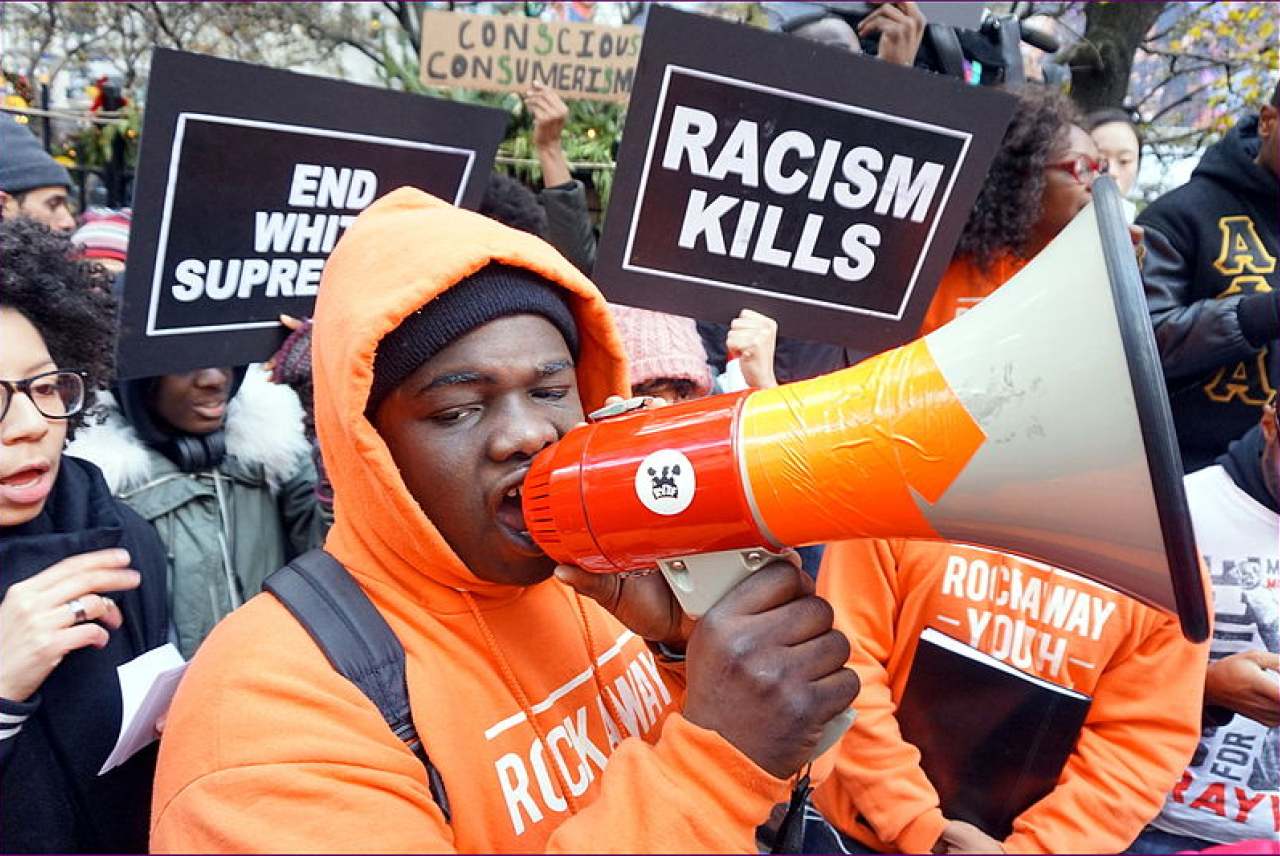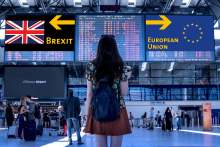In the last week, companies like Amazon, Ben and Jerry’s and L’Oreal have published statements declaring solidarity with Black and BAME communities, as anti-racism protests sweep across America and beyond since the brutal murder of George Floyd on 25th May.
Amazon’s statement claiming that it “stand[s] in solidarity with the black community – our employees, customers, and partners – in the fight against systemic racism and injustice,” has been greeted with derision by many who see it as a hollow gesture that has little basis in reality.
Over the years Amazon has repeatedly been called out for the impact that its practices have on black and BAME people.
“Empty statements like Amazon’s show black lives only matter to big business when there’s profit to be made,” Micha Frazer-Carroll, Opinion Editor of Gal Dem, writes in The Independent. “In the case of Amazon, it’s hard for me to quantify how deeply hypocritical I feel the company’s supposed stance is.”
Amazon’s poor policies
Below we run down some of the criticisms levelled against Amazon in the wake of their statement.
1. The mistreatment of workers in its warehouses
Amazon is notorious for the poor treatment of those in its warehouses. Employees have condemned the poor hours, low wages and punitive targets demanded of workers.
In February over 600 workers at a warehouse in New York signed a petition demanding better conditions and drawing attention to reports of high injury rates at the centre, which were found to have three times the national average for warehouses.
Since the outbreak of Covid-19, employees have said that not enough is being done to protect their safety. Many said that social distancing was not possible, that the company had not supported workers with the virus or having to shield, and that it had increased productivity targets to meet rising demand.
These poor conditions disproportionately affect black workers. 26.5% of Amazon’s employees in the US are black / African American (compared to 13.4% of the population). According to the most recent public information (from 2014), 85% of black Amazon employees work in its warehouses, or other similar ‘low-skilled’ roles.
In March, Amazon fired Chris Smalls, a black employee who led a walk out at a New York facility. Chris Smalls and other strikers had demanded the temporary closure of the facility for cleaning, after one of its workers tested positive for Covid-19.
“It’s a shame on them,” Smalls told Vice News. “To fire someone after five years for sticking up for people and trying to give them a voice.”
In the following week, Amazon General Counsel David Zapolsky was accused of using ‘racist tropes’ to smear Chris Smalls, after his notes from a meeting were forwarded widely in the company.
The memo exposed plans to make Smalls “the face of the entire union/ organising movement”. Zapolsky wrote, “He’s not smart, or articulate, and to the extent the press wants to focus on us versus him, we will be in a much stronger PR position than simply explaining for the umpteenth time how we’re trying to protect workers.”
The New York state attorney general has said that the company may have broken the state’s whistleblower law in firing Smalls, and called Amazon’s conduct “disgraceful”.
2. Racial-bias in its facial recognition technology
In 2018, the ACLU published a report which found that Amazon’s ‘Rekognition’ facial recognition software was fundamentally racially-biased. In tests, it disproportionately identified black members of Congress as people who had been arrested and had their mugshot in a police database. “Nearly 40 percent of Rekognition’s false matches in our test were of people of color, even though they make up only 20 percent of Congress,” the report stated.
In May, a similar test by Comparitech again found that of the misidentifications, a disproportionate number of them were people of colour. Of 12 politicians misidentified as those who had been arrested, with a confidence threshold of 90% or higher, half of them were BAME. Yet, people of colour make up just a fifth of US Congresspeople and a 10th of the UK Parliament.
The technology is used by US law enforcement.
Experts are now warning that facial recognition software might be used by US Police Departments to falsely identify those at Black Lives Matter protests.
Mutale Nkonde, a fellow at the Berkman Klein Center of Internet & Society at Harvard University and a non-resident fellow at the Digital Civil Society Lab at the Stanford Center on Philanthropy and Civil Society, said:
“Police will use the mug shots of people who have been committed for other crimes to train facial recognition, arguing that if you’ve committed one crime then you’ve committed another... First off, that’s unconstitutional. Second, that means that if you’ve been arrested for looting in the past, but haven’t looted recently, the police could now come arrest you for looting in May or June because your picture is in the system and it may have turned up a false positive.”
On 10th June 2020, Amazon announced it would stop supplying US police officers with its facial recognition technology for one year, following IBM's move out of facial recognition technology entirely. But digital rights group Fight for the Future, which has called on Congress to ban the government's use of facial recognition, called Amazon's moratorium "nothing more than a public relations stunt".
3. Enabling racial profiling
Another of Amazon’s contracts with law enforcement agencies in the US has been criticised for encouraging racial profiling.
Amazon’s home surveillance company, Ring, has partnerships with over 200 police departments in the US. As part of some of these partnerships, Ring has incentivised police to encourage community members to use its neighbourhood watch app.
The app has been found to have issues with racial profiling. A review of over 100 posts on the app found that the majority of people who users had reported as ‘suspicious’ were people of colour.
“Given the reality of police violence, with impunity, impacting primarily people of colour in the United States, these kinds of acts threaten the lives of third parties who are simply, in some cases, doing their jobs or living in their own neighbourhoods,” Shahid Buttar, director of grass-roots advocacy for the Electronic Frontier Foundation, told Motherboard, who conducted the review.
4. Advertising on white supremacist media
Amazon remains the last large advertiser on Breitbart, the far-right media outlet, which once featured a ‘Black Crime’ section.
Breitbart is known for its hate-speech, and Nandini Jammi, who co-founded the Sleeping Giants campaign says that the site is “funded by white supremacists and written by white supremacists”.
In 2018, over 2,500 advertisers cut ties with the media outlet after pressure from the campaign. Yet, Amazon continues to advertise with the media outlet.
Amazon must change its practices
Athena, a coalition of organisations fighting against Amazon in the US, has spoken out about the company’s hypocrisy.
It adds to the growing list of Amazon’s racist practices, pointing to recent reports that Amazon allows payments to far-right groups through its platforms, as well as its provision of tech services to US Immigration and Customs Enforcement, which has been used for Trump’s racist and anti-immigration agenda. And it is calling on the company to address its own behaviour.
“Racist power will not dismantle itself: that is our collective work.”
Amazon states “The inequitable and brutal treatment of Black people in our country must stop”. We would argue that it must start with its own practices first.






